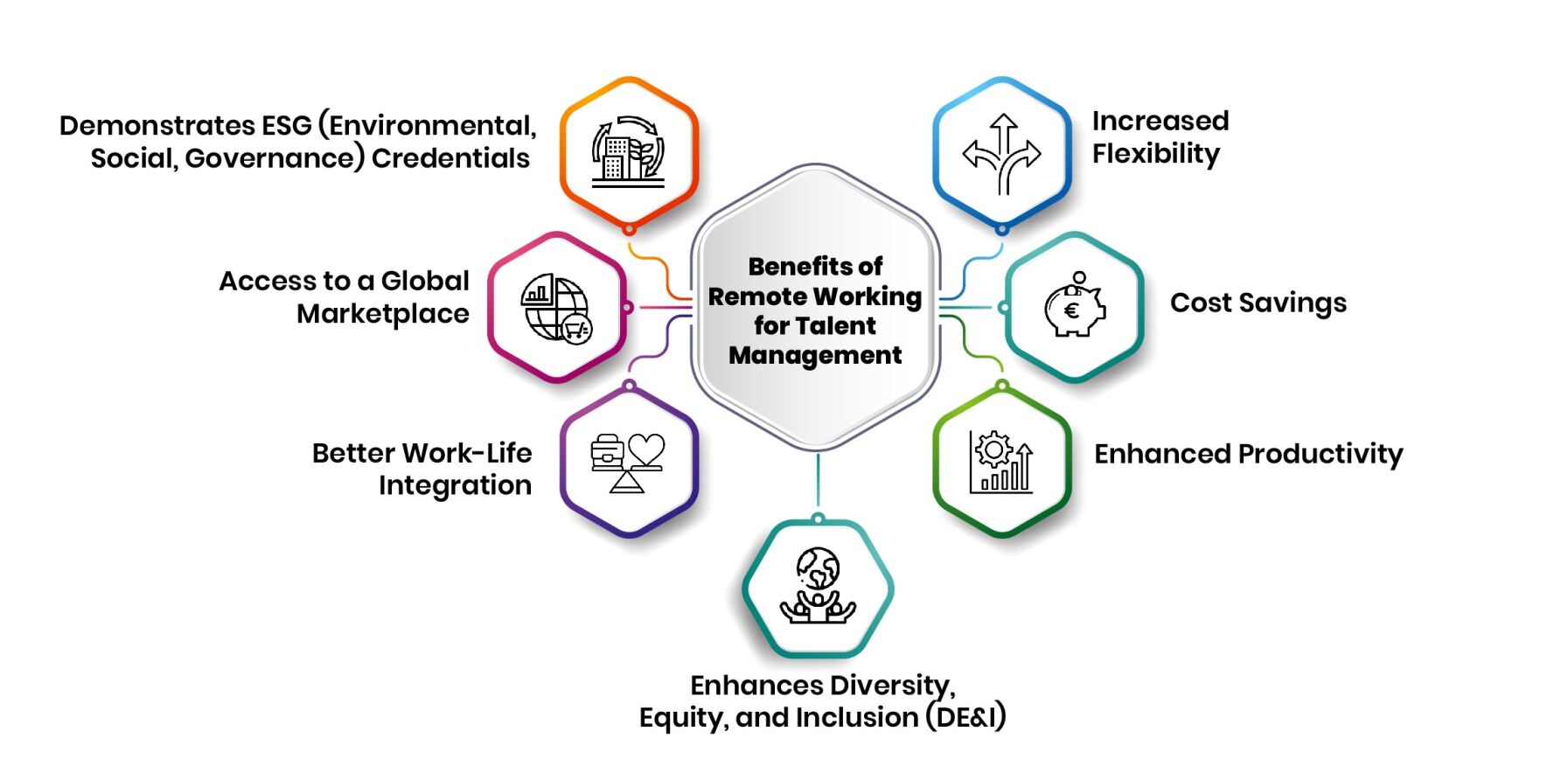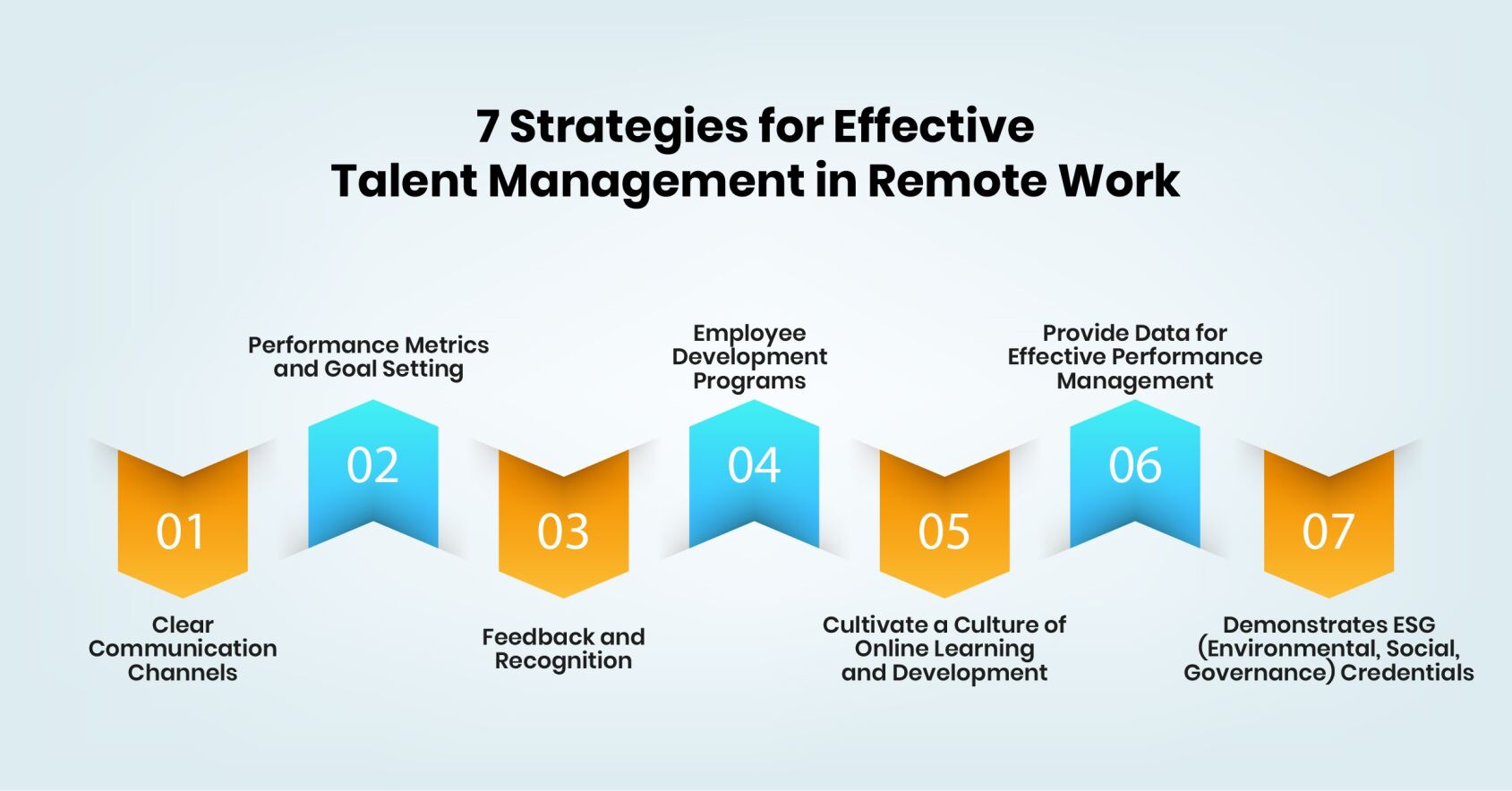
The COVID-19 pandemic reshaped work dynamics, emphasizing remote or hybrid models. Companies are adopting either a fully remote working model or a hybrid approach that combines working from home and office work.
Research conducted by the ONS in early 2023 revealed that 40% of working adults had engaged in remote work at least once in the week preceding the survey. Making Talent Management strategies a critical aspect for productivity and satisfaction of remote teams. This blog explores the intricacies of Talent Management in the context of remote work, addressing challenges, uncovering benefits, and proposing strategies and HR technology for effective management.
A talent management strategy is a lasting plan to ensure your business has skilled individuals in the right roles, fostering current and future success. Talent management refers to the systematic process of identifying, attracting, developing, and retaining top talent within an organization. It encompasses various HR functions such as recruitment, onboarding, performance management, and succession planning. In the context of remote work, talent management becomes even more crucial as it necessitates a shift in traditional approaches to accommodate the unique challenges and opportunities presented by a dispersed workforce.
While remote work offers unprecedented flexibility, it also brings forth a set of challenges for talent management. Communication barriers, difficulty in monitoring employee performance, and fostering a sense of belonging are among the top challenges faced by HR professionals. Remote work can introduce challenges to talent management unless companies prioritize robust leadership and internal communication.
It's not just the onboarding process that demands attention; management practices also need updating for those overseeing remote teams. Effectively leading individuals visible only through screens requires a heightened emphasis on communication and support compared to traditional in-person leadership.
Additionally, the integration of remote workers necessitates a thorough onboarding process to swiftly integrate recruits into the company, despite physical distances. Failure to achieve this could result in disillusioned new talent, jeopardizing the overall talent management strategy.
Furthermore, the adoption of appropriate communication technology is essential. Remote workers must be proficient in using necessary systems and have access to handbooks and intranets to foster a sense of belonging and enable them to work remotely at a high standard. Digital HR software, such as our remote work software, can assist companies without physical offices in implementing an effective talent management strategy by providing crucial data on performance, reviews, and working hours.
Despite the challenges, remote work brings forth several advantages for Talent Management. Access to a global talent pool becomes easier, allowing organizations to tap into diverse skills and perspectives. Moreover, the flexibility of remote work often leads to increased job satisfaction and employee retention. Reduced overhead costs associated with physical office spaces can be redirected towards employee development and well-being programs, contributing to a positive work culture.

In remote work, talent management policies are to be guided by best practices that leverage insights from both AI and community input. These strategies are instrumental in ensuring effective talent management in a distributed work environment.

In 2019, HR primarily centered on traditional personnel management and administrative tasks. Presently, HR has transformed into a strategic partner, utilizing advanced HR technologies like AI and data analytics for data-driven decisions. The focus has shifted to employee well-being, diversity, inclusion, and agile work arrangements. HR's role is expanding beyond departmental boundaries, becoming pivotal to an organization's strategic success and influencing the future workforce.
HR technology plays a pivotal role in overcoming the challenges associated with remote Talent Management. The following technologies can be leveraged for effective remote workforce management:
HR technology can enhance talent access and deployment by amalgamating diverse data inputs (such as job level, geography, and skills) to customize project suggestions. It can also consider individual inputs like preferences and career goals, recommending cross-functional projects beyond conventional talent paths.
Talent Management in the era of remote work demands a proactive approach that embraces the challenges and leverages the benefits. Clear communication, well-defined strategies, and the integration of HR technology are essential components of effective remote Talent Management. As organizations navigate this new terrain, prioritizing the well-being and professional growth of remote employees will not only ensure continued productivity but also contribute to a resilient and thriving workforce. Embracing change and investing in innovative solutions will position organizations for success in the evolving landscape of work.

CredBadge™ is a proprietary, secure, digital badging platform that provides for seamless authentication and verification of credentials across digital media worldwide.
CredBadge™ powered credentials ensure that professionals can showcase and verify their qualifications and credentials across all digital platforms, and at any time, across the planet.

Please enter the License Number/Unique Credential Code of the certificant. Results will be displayed if the person holds an active credential from TMI.